Sweet and tangy, and made with just four basic ingredients, my easy vegan lemon curd recipe is ready in a jiffy, and a sure-fire tea-time winner!
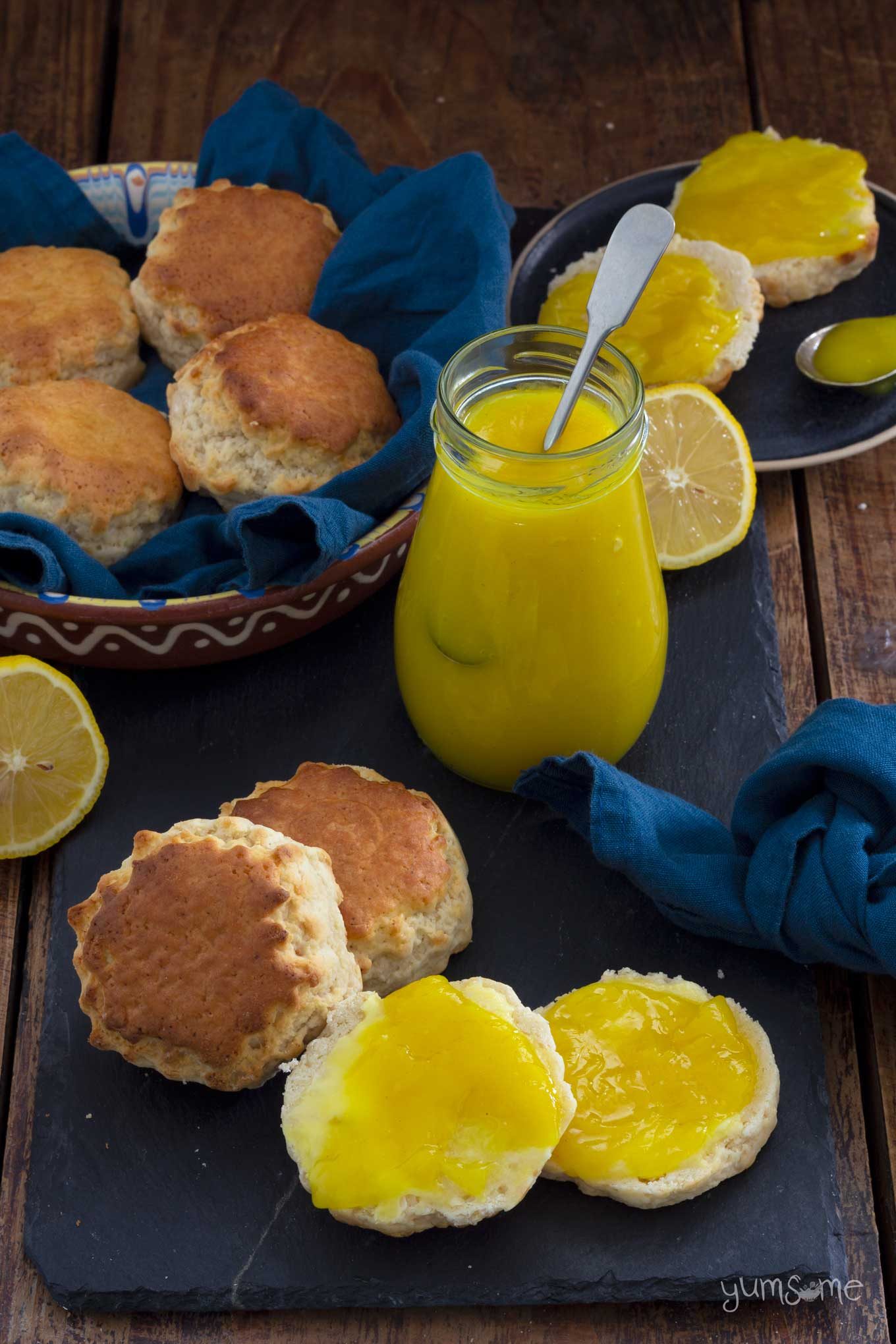
This post contains affiliate links. For more information, please see my privacy policy.
Easy vegan lemon curd recipe
For as long as I can remember, I've had a jar of home-made lemon curd in my pantry (umm... not the same jar, of course!). It's always been one of my favourite sweet spreads, and as a child, I was frequently caught with a jar in one hand, a spoon in the other, and a very contented grin on my face!
My gran didn't ever scold me - she just ensured she made large enough batches to cope with my lemon curd addiction!
I don't remember how old I was when Gran taught me how to make lemon curd… it feels as though it's something I've always known how to cook. However, back in 2005, when I cut eggs and dairy from my diet, I knew I had to find a way to make vegan lemon curd.
Which, as it turned out, was really easy. Huzzah!
By the way, there's a fair amount of historical information about lemon curd - and lemon cheese, as it's sometimes called - in this post, so if you're not interested in any of that, do feel free to click on the 'jump to recipe button' above. However, I do recommend you read on because it's pretty fascinating stuff. Plus, there are some bonus recipes!
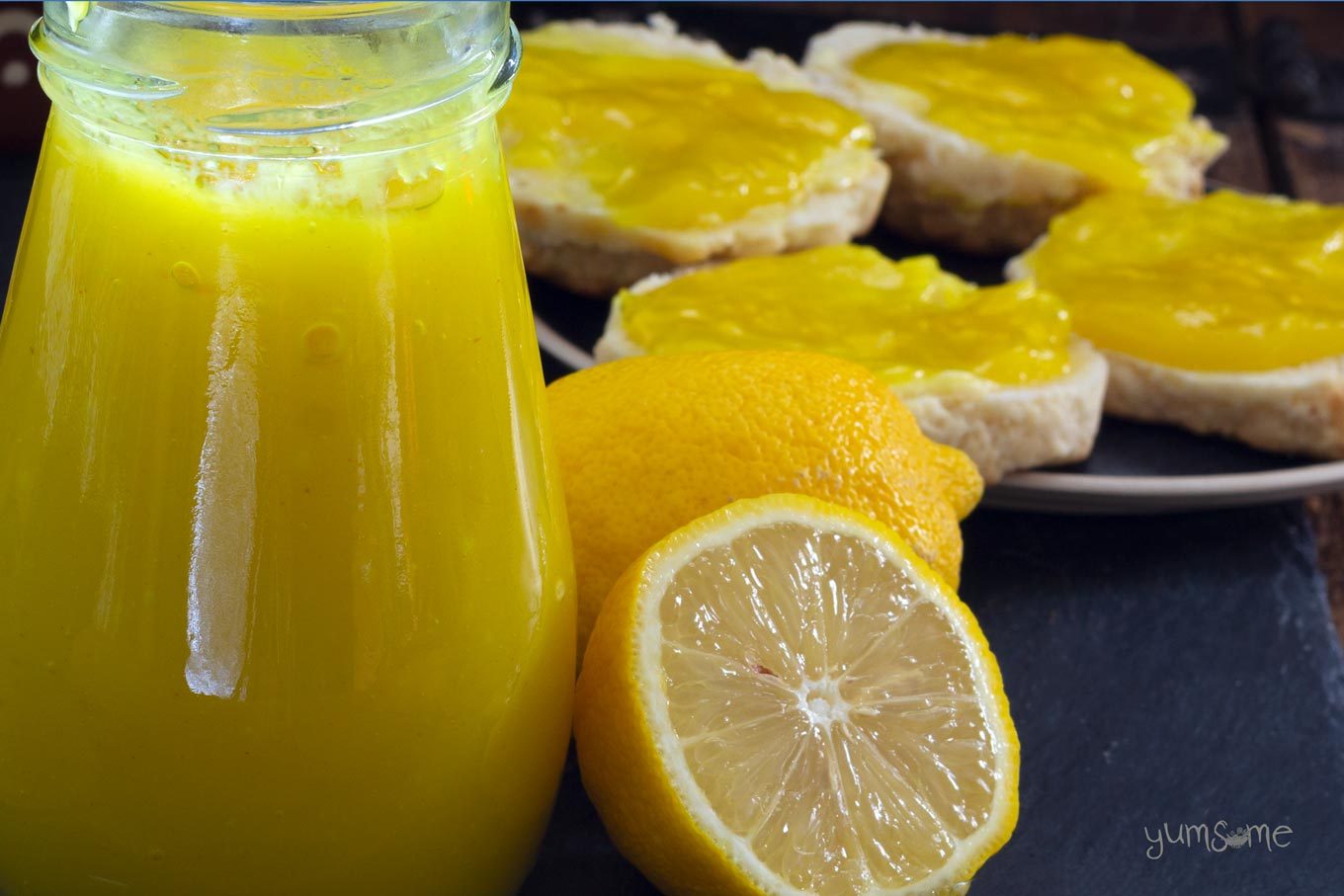
Traditional non-vegan lemon curd
The traditional way to make lemon curd is with eggs and butter (plus lemons and sugar, of course!). You place the sugar, lemon juice and zest, and butter in a pan, add beaten eggs, and cook until thickened. Then decant into sterilised jars.
An older method was to rasp the lemons on a loaf of sugar*, until all the zest had come away, then dissolve the lemon-infused sugar with lemon juice and butter in a bowl set over a pan of simmering water. You'd then whisk in beaten eggs, a little at a time, and then continue to cook until thickened.
*Loaf sugar is actually the same as jaggery; unrefined cane sugar. Sri Lankan jaggery, though, is made from coconut toddy. While it can be bought granulated, it's actually very common to find jaggery in Indian supermarkets in block form, so if you fancy having a go at rasping your lemons against some loaf sugar, well, you can!
A Brief History of Lemon Curd
When was lemon curd invented?
To my knowledge, lemon curd first appears in English cookbooks around the mid-1700s, so it's probably fair to say that it had been around for a bit beforehand.
Back then, cookbooks were largely aimed at domestic staff, which explains why they are somewhat lacking in information, such as how long to bake things (see below). I view cookbooks such as these more as collections of ideas, as opposed to comprehensive instructions!
It's only really post-WWI that we really see cookbooks being aimed at housewives. This is mainly because the First World War irrevocably changed the face of domestic service in Britain. Most middle-class women suddenly discovered that they had to learn how to cook and clean for themselves!
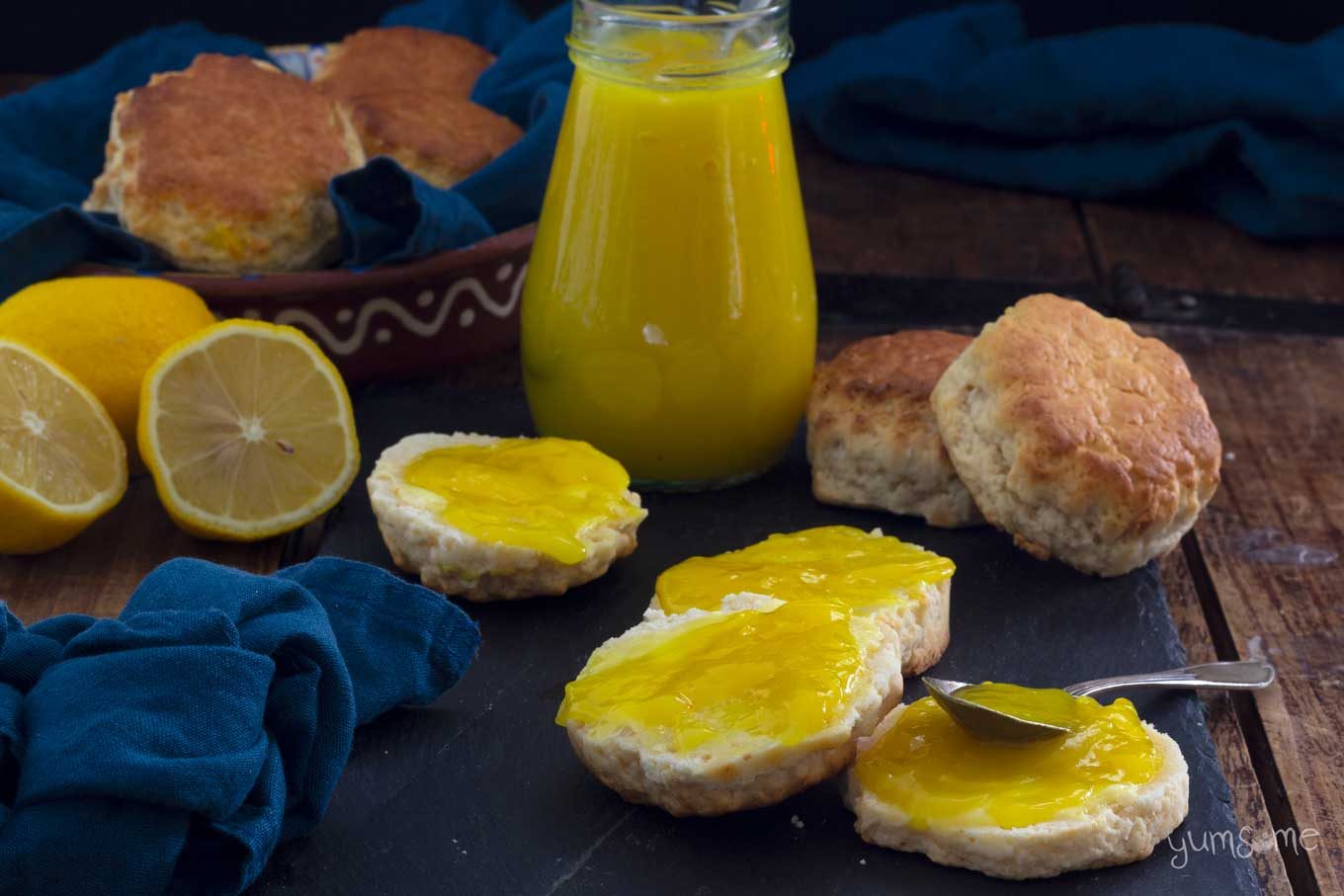
Why was it called lemon cheese?
Simply because it was a sweet soft cheese! Cream was curdled with lemon juice, the whey drained from the curds, which were then pressed into shape.
Indian paneer is still made in much the same way. However, unlike paneer (and indeed cottage cheese or farmers cheese), lemon cheese was made with far more lemon juice and zest, plus sugar.
Here's a recipe for lemon cheese from 1844 in The Lady's Own Cookbook by Lady Charlotte Campbell Bury…
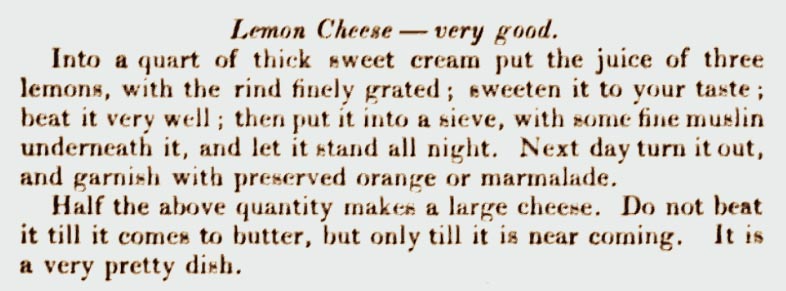
It's easy to see from this recipe why lemon cheese is so-called, although to be fair, this is more like lemon-flavoured labneh, since the cream is not heated, and therefore doesn't separate into curds and whey. The whey is simply left to drain from the rest of the 'cheese'.
Here's a lemon curd recipe from the same book…
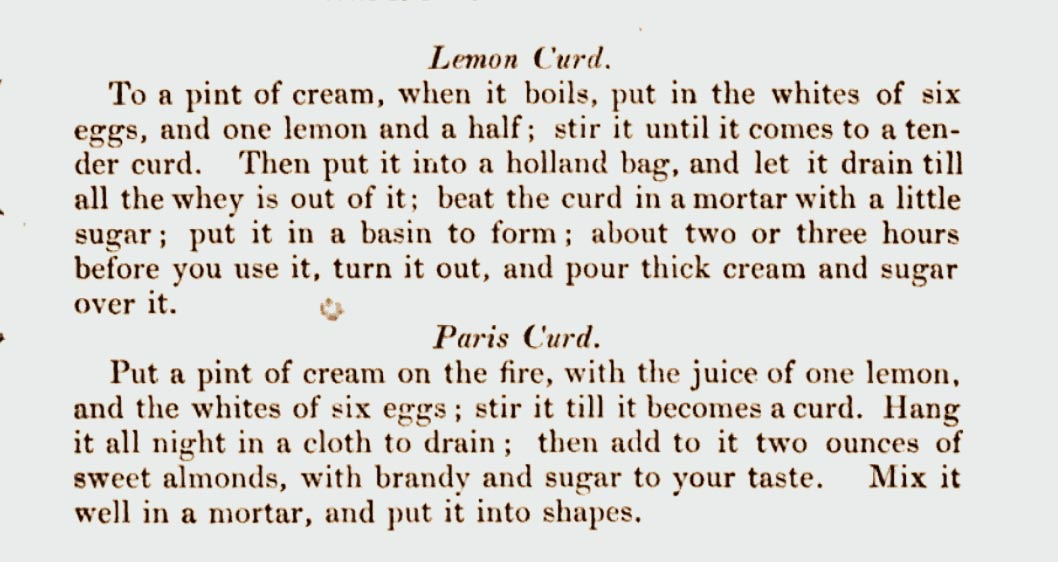
The process for the above sounds far more cheese-like than the first one!
Lemon Curd for Cheesecake
In addition to lemon cheese recipes, there are some for 'lemon cheesecake' from at least the 18th century. These are essentially lemon curd tarts, and not, as the name might suggest, cheesecakes as we know them today!
Again, from The Lady's Own Cookbook…
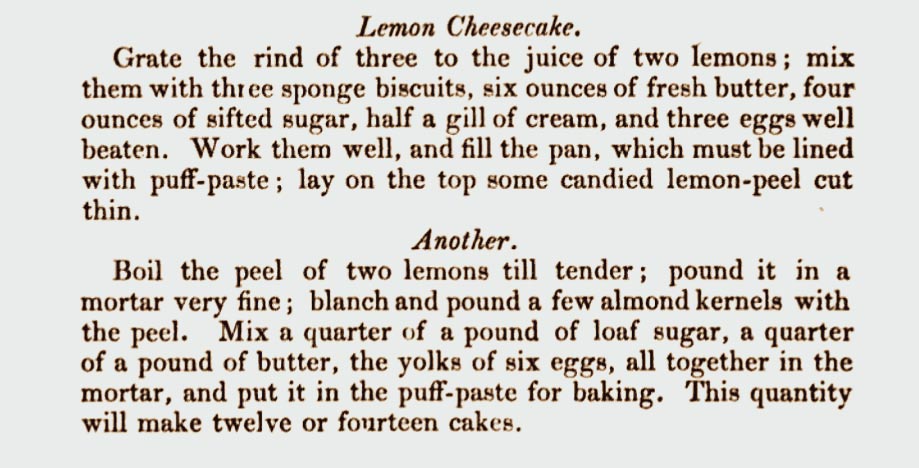
Note how there are no further instructions, say, for how long you bake the lemon cheesecakes! Presumably because it's assumed that you know how long a pie crust takes, therefore you don't need to be told.
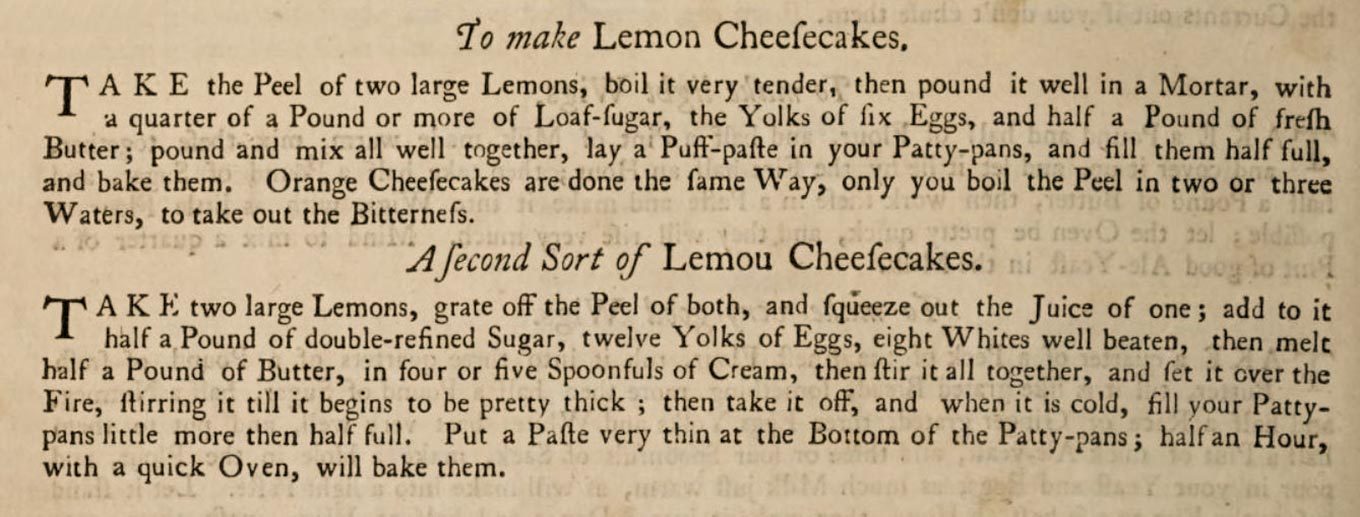
Mrs Beeton's Lemon Curd
As I mentioned in my vegan cauliflower cheese recipe, my gran had an old copy of Mrs Beeton's The Book of Household Management but although there are plenty of recipes for lemon puddings, which are made similarly, albeit mostly with milk or cream, there are, surprisingly, none for lemon curd (nor indeed, lemon cheese).
Perhaps lemon cheese had fallen out of favour by 1861. Perhaps Mrs Beeton's town and city-dwelling demographic wasn't up for making batches of cheese!
There is a recipe for lemon cheesecake though, the filling of which is basically the same as the lemon curd we all know and love today.
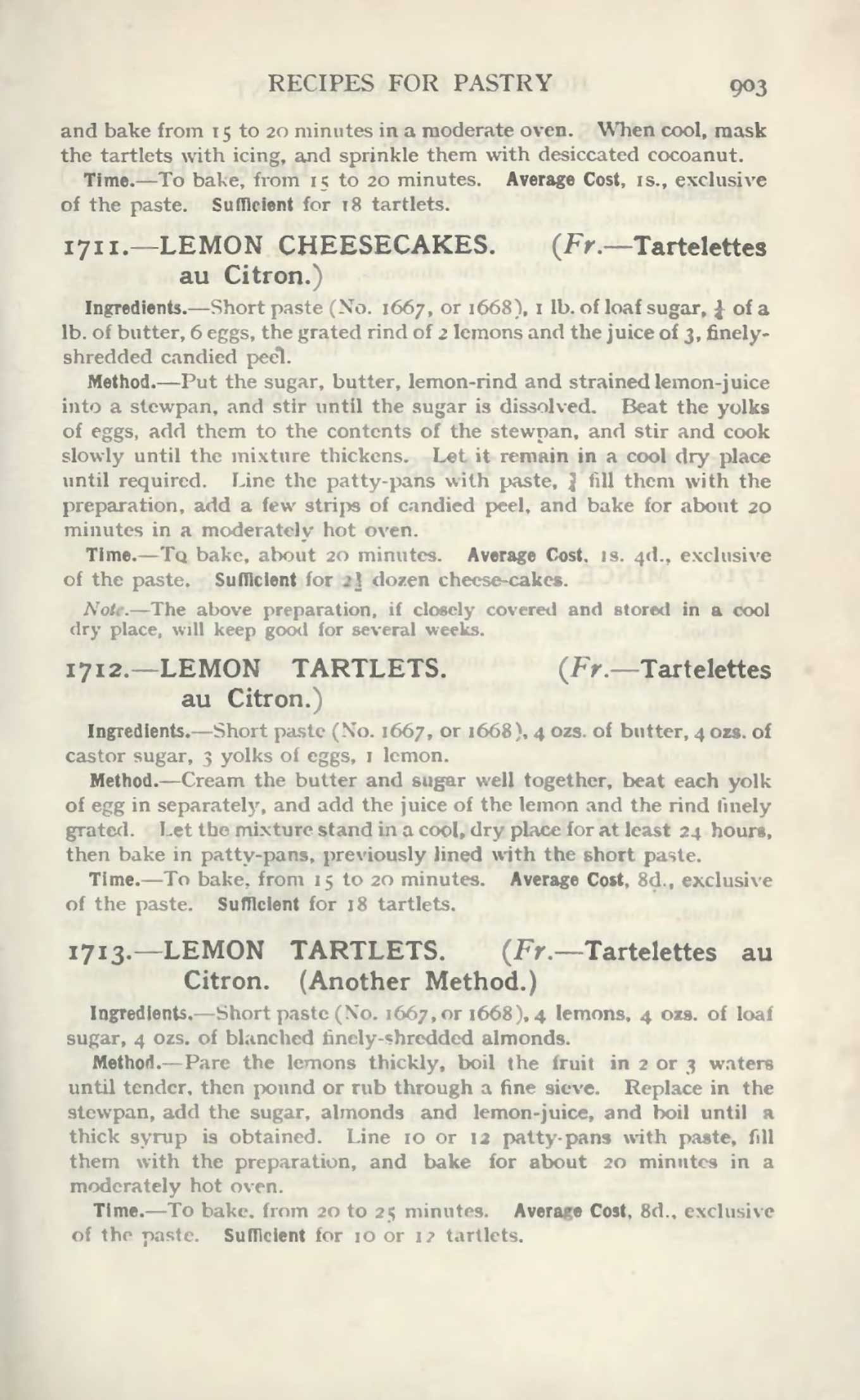
On a side note, according to Mrs Beeton...
...lemon juice, which in addition to the agreeableness of its flavour, is also particularly cooling and grateful.
I'm really not sure about the whole grateful thing but I do agree with lemon juice being cooling. In 2000, I spent some time in Turkey, and everywhere I went, in addition to apple tea and lokum (Turkish Delight), I was offered a splash of limon kolonyasi on my hands. Although to be fair, I was very grateful for it!
Free cookbooks!
You can get free copies of these books from Project Gutenberg. It's all completely legal, and the books are in several formats.
The Lady's Own Cookbook by Lady Charlotte Campbell Bury
The Book of Household Management by Mrs Isabella Beeton
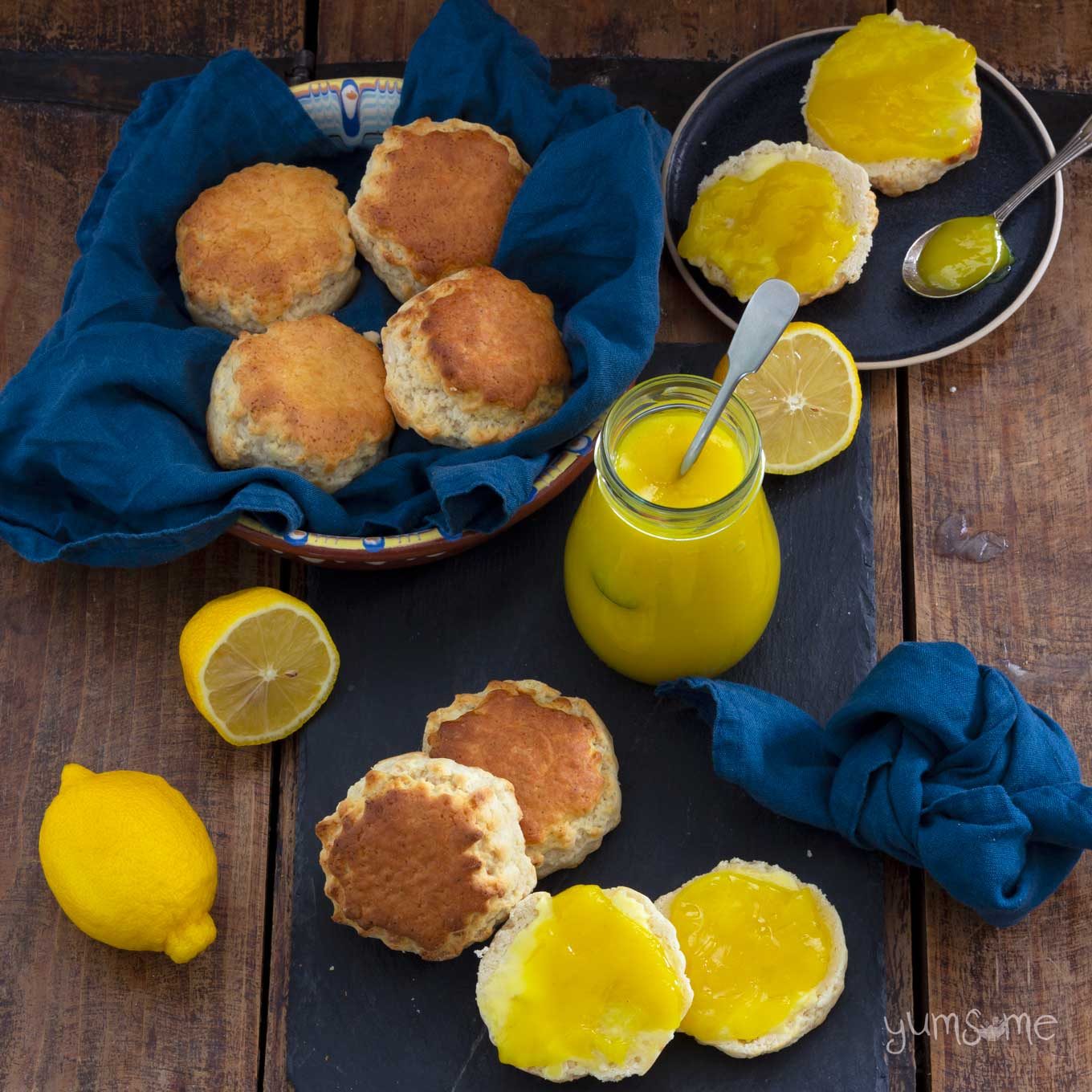
How did we get from lemon cheese to the lemon curd we have now?
If you can get to the Westminster City Archives in London, you'll be able to view a copy of The Cookbook of Unknown Ladies - a collection of recipes written by a group of anonymous women, which span around 150 years of British culinary history. (From around the mid-1600s to the beginning of the 19th century.) It's a fascinating journey into the evolution of modern cooking.
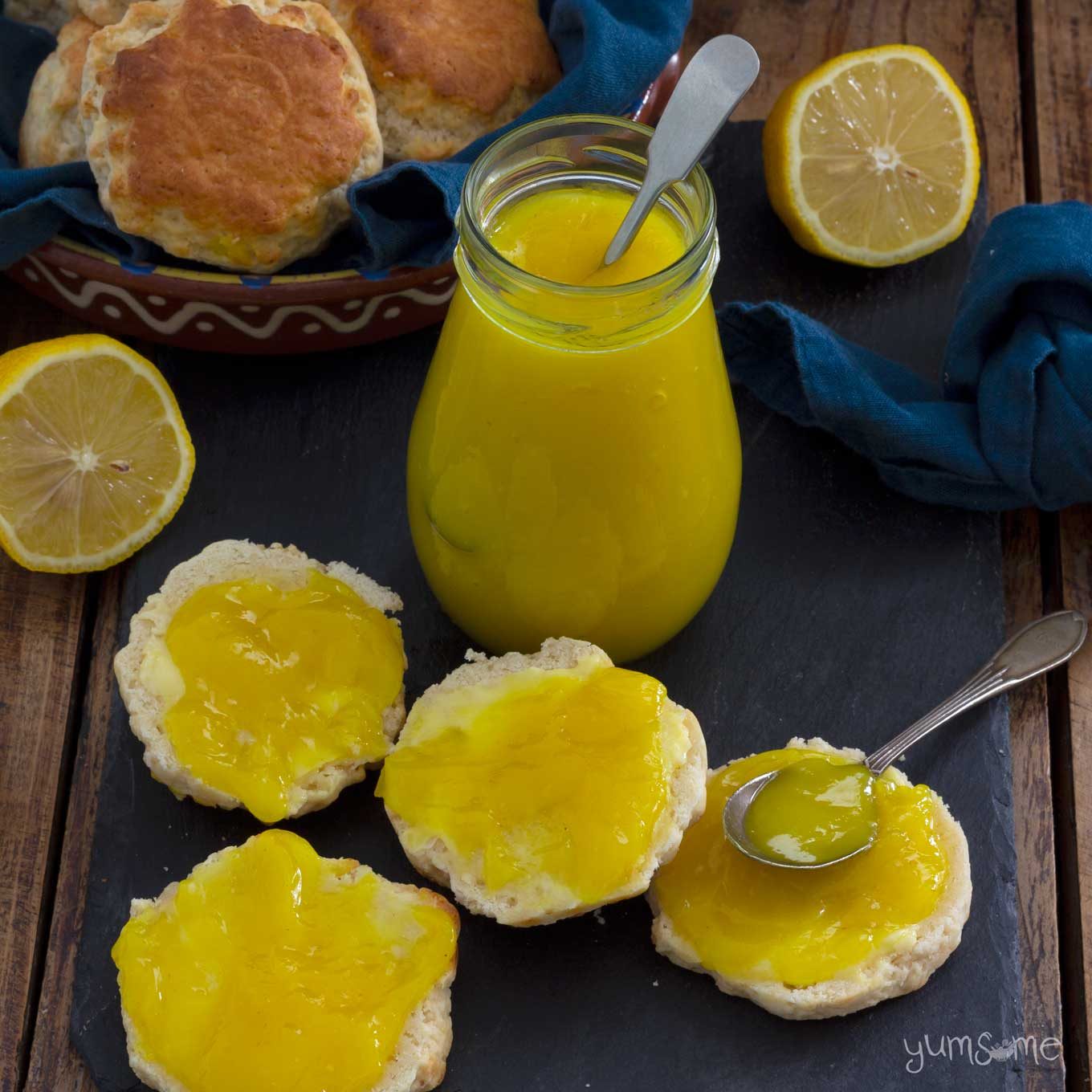
Here are three recipes, which, I think, help to better understand how we got from the lemon cheese of yesteryear to today's lemon curd.
Lemmon Cheese
A qurt of good thick sweet creame. Put to it the juce of four lemons as as mutch peel as well give it an agreeable flavour. Sweeten it to your taste & add a littile peach or orange flower water if you like it. Whip it up as you would for sellabubs but very solid. If you have a tin vat, put a thin cloath in it & pour in your cream. If not, put it in a napkin and tye it pritty close. Hang it up to let the whey run from it. Make it the night be fore you use it. Garnish it with currant jelliy or candied oranges.
Lemmon Caudle
Boyle some milk & turn it with ye juce of a lemon till it is very clear. Take of the curd & strain the whey, & season it with nutmeg & sugar, & thicken it with the yolks of eggs & a little rose water.
Lemmons Cream
To four large lemmons squeesd put 3 qrs of a pd of the finest loaf sugar, 8 or 9 spoonfuls of water & a piece of the peel. Set it over the fire untill the sugar tis melted. Put in the whites of 4 eggs & strain it through a diaper napkin, doubled. Sett it on ye fire a gain & stir it all ye while. When it grows thick, take it off. Put in two spoonfuls of orange flower water. Lay some shreds of boiled lemmon peel at the bottom of the glasses.
Caudle, by the way, is a warm drink, not entirely dissimilar to eggnog, primarily for those who were sick, or for mothers who'd recently given birth. Written caudle recipes date back to at least the 14th century.
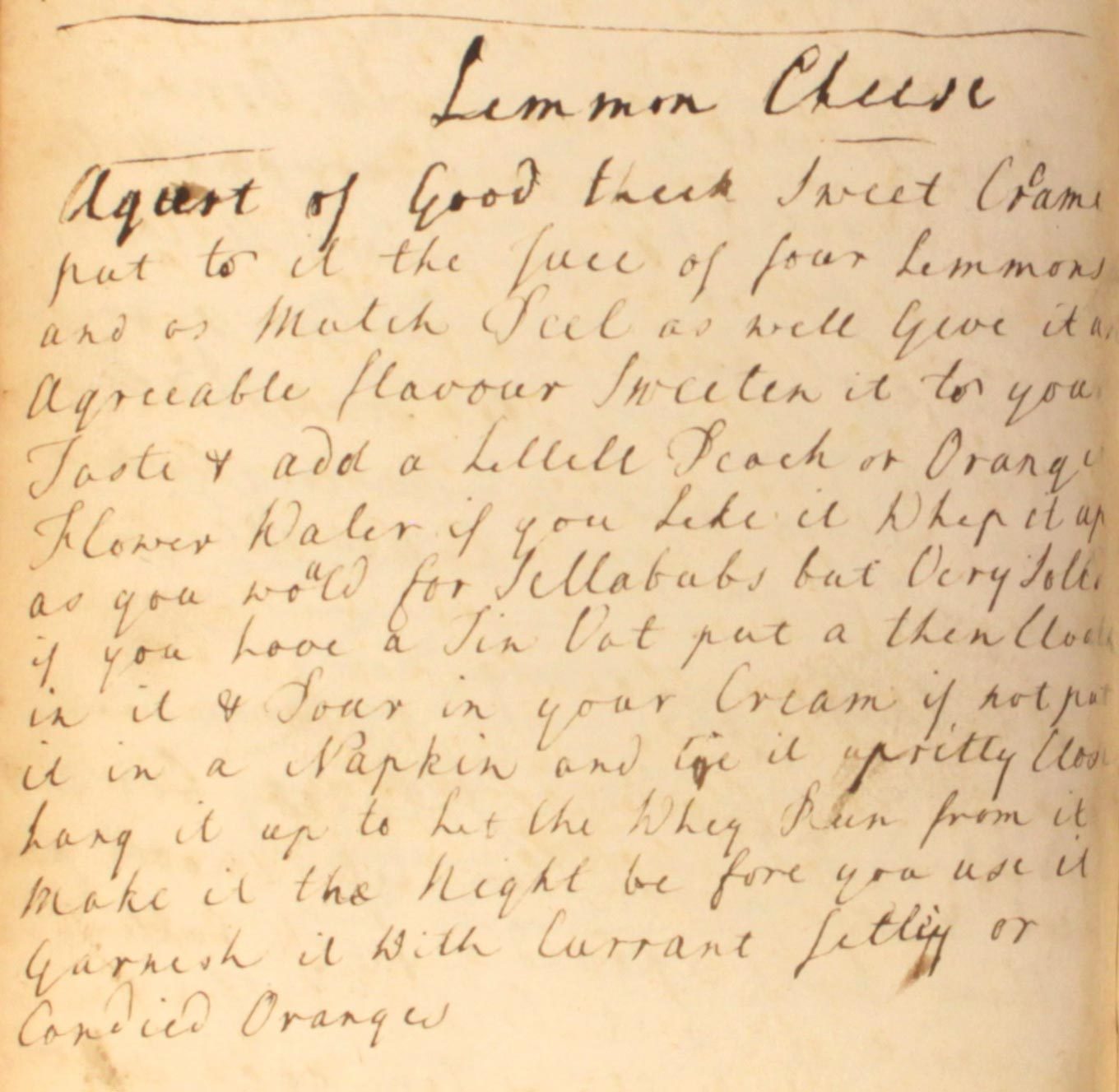
Hannah Glasse's Lemon Curd Recipes
Hannah Glasse*, in her 1747 book, The Art of Cookery Made Plain and Easy: Which Far Exceeds Any Thing Of The Kind Ever Yet Published, gives the following recipes for lemon curd.
Or rather, what are referred to by both Mrs Beeton and Lady Bury as lemon cheesecakes…
To make a Lemon-Pudding.
TAKE three lemons, and cut the rind off very thin, boil them in three separate waters till very tender, then pound them very fine in a mortar; have ready a quarter of a pound of Naples biscuit, boiled up in a quart of milk or cream; mix them and the lemon rind with it; beat up twelve yolks and six whites of eggs very fine, melt a quarter of a pound of fresh butter, half a pound of fine sugar, a little orange-flower water; mix all well together, put it over the stove, and keep it stirring till it is thick, squeeze the juice of half a lemon in: put puff-paste round the rim of your dish, put the pudding stuff in, cut some candied sweet meats and put over: bake it three quarters of an hour, and send it up hot.
Another Way to make a Lemon-Pudding.
TAKE three lemons and grate the rinds off, beat up twelve yolks and six whites of eggs, put in half a pint of cream, half a pound of fine sugar, a little orange-flower-water, a quarter plus a pound of butter melted; mix all well together, squeeze in the juice of two lemons; put it over the stove, and keep stirring it till it is thick; put a puff-paste round the rim of the dish, put in your pudding stuff with some candied sweet meats cut small over it, and bake it three quarters of an hour.

(*Hannah Glasse was the Mrs Beeton of her time; sometimes erroneously credited with the famous intro to a roast hare recipe, "First catch your hare..."!)
Where can I get a copy of The Art of Cookery?
You can download a digitised copy of The Art of Cookery Made Plain and Easy - again, legally - from here. (There's a box on the right-hand side of the page, with all the options.)
Here is an online version.
Or a more versions, here (do be aware though that for text versions, the transcription software has not been able to tell the difference between s and f, so some words do look a bit odd!).
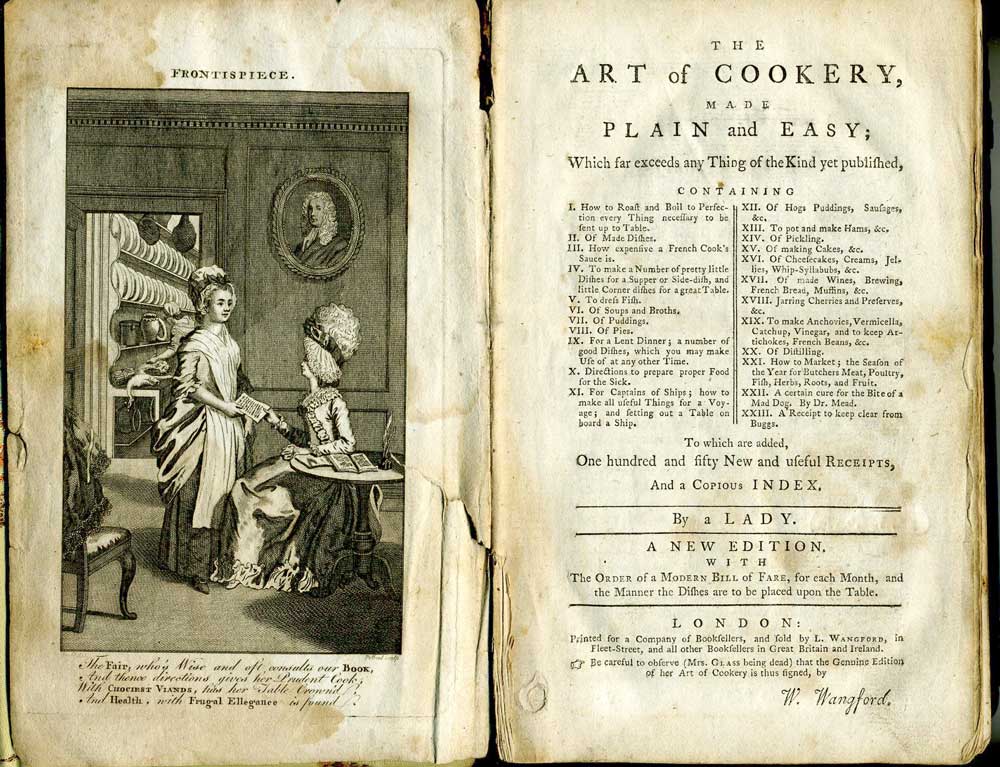
Modern Lemon Curd and Lemon Cheese
Is there really any difference between lemon cheese and lemon curd now?
Some folk will tell you that lemon cheese is more like jam, and will keep for longer than lemon curd. Some will say it's a regional thing; that in the north it's always been called lemon cheese, while in the south, lemon curd is the preferred moniker.
Others claim that it just comes down to ingredients; that lemon cheese is made with butter, and lemon curd, with margarine. However, according to the British Trading Standards Office, the ingredients for both lemon cheese and lemon curd are exactly the same. At least, commercially-speaking.
What I can tell you with complete authority though, is that home-made lemon curd knocks spots off anything you can buy in the shops!
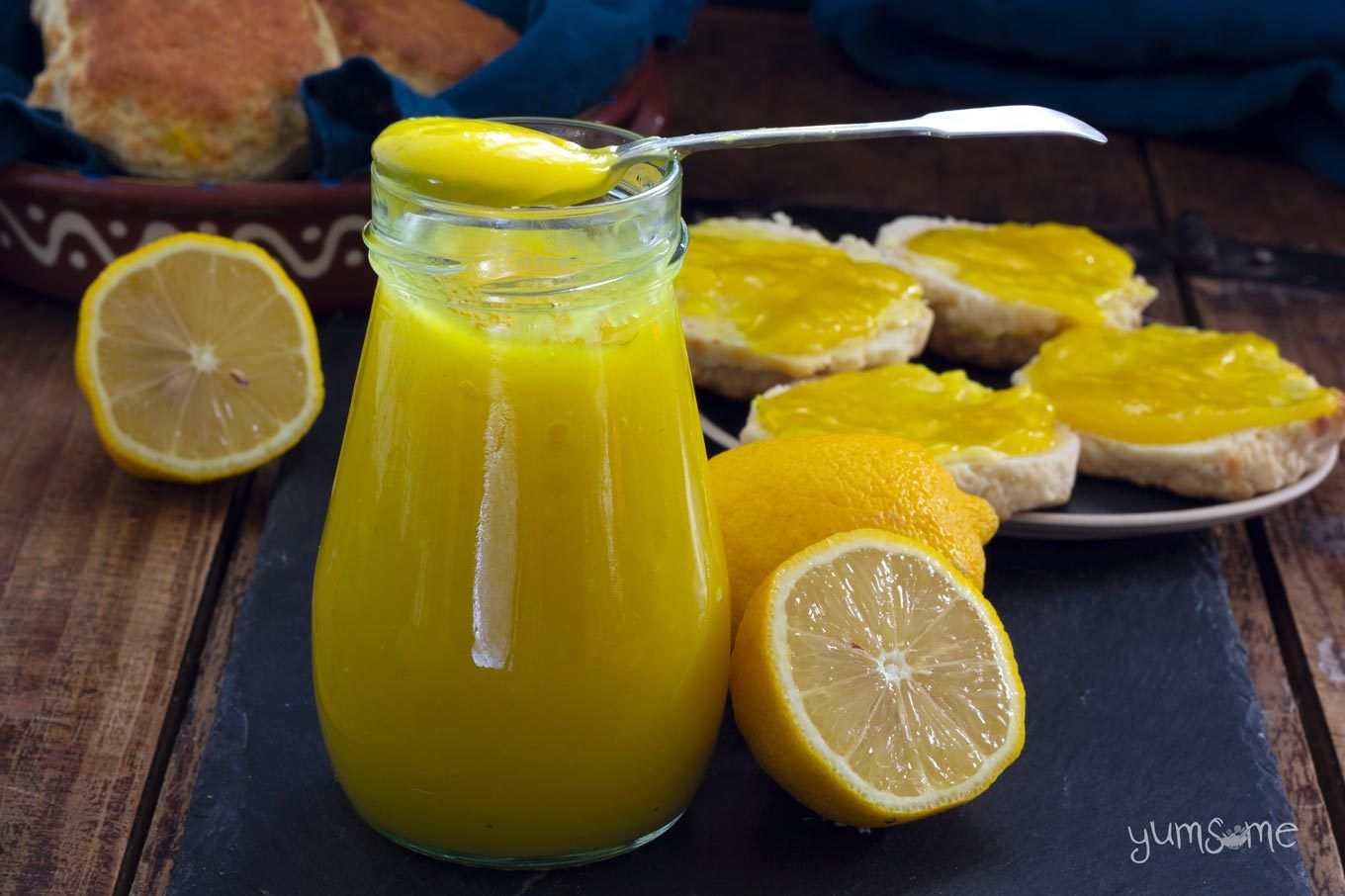
How to make vegan lemon curd
By far the easiest way to make this vegan lemon curd is to put the dry ingredients, plus a tablespoon of lemon juice, into a blender (as usual, I favour the VAC2), and blitz for a few seconds, until well-blended. Boil the lemon juice in a pan, then add the contents of the blender, and bring to the boil to thicken it. Reduce the heat, and cook for a couple of minutes, until it's completely smooth, then beat in the marg.
Once it's cooked, you can plonk the lemon curd into sterilised jars, to squirrel away for later!
How Long Does Vegan Lemon Curd Keep?
What, you mean, assuming you're not a lemon curd hog, like me? Ha ha! OK, once opened, store your vegan lemon curd in the fridge for up to two weeks.
However, if you can the lemon curd (see my zacuscă recipe - for instructions), it should keep, unopened, for a year or so.
Notes for Making Vegan Lemon Curd
What can go wrong with making this vegan lemon curd?
Not a lot, really but if you don't blend the cornflour, and whisk it while it's thickening, the lemon curd can become lumpy. If you don't cook it for long enough, it will be powdery.
My lemon curd tastes powdery, why?
You haven't cooked the cornflour for long enough. It needs to have a few minutes to cook through.
Can I make other fruit curds?
Oh, very definitely yes! I sometimes make fruit curd with orange or tangerine juice, pink grapefruit, lime, and blends of all of these.
Pomelo juice also makes a wonderful fruit curd, and when I make my rhubarb crumble bars, I sometimes make rhubarb curd from the leftover juice. I reduce the amount of added sugar though because the rhubarb juice already has quite a bit in it.
Fun fact: In tropical countries, citrus fruit does not change from green to yellow or orange. It needs cool winter temperatures to change colour. Furthermore, the colour of citrus fruit's skin is no indication of maturity (and therefore, flavour), so next time you select a juicy, sweet-looking orange, and it's actually eye-wateringly sour or bitter, you'll know why… It's been harvested before reaching maturity.
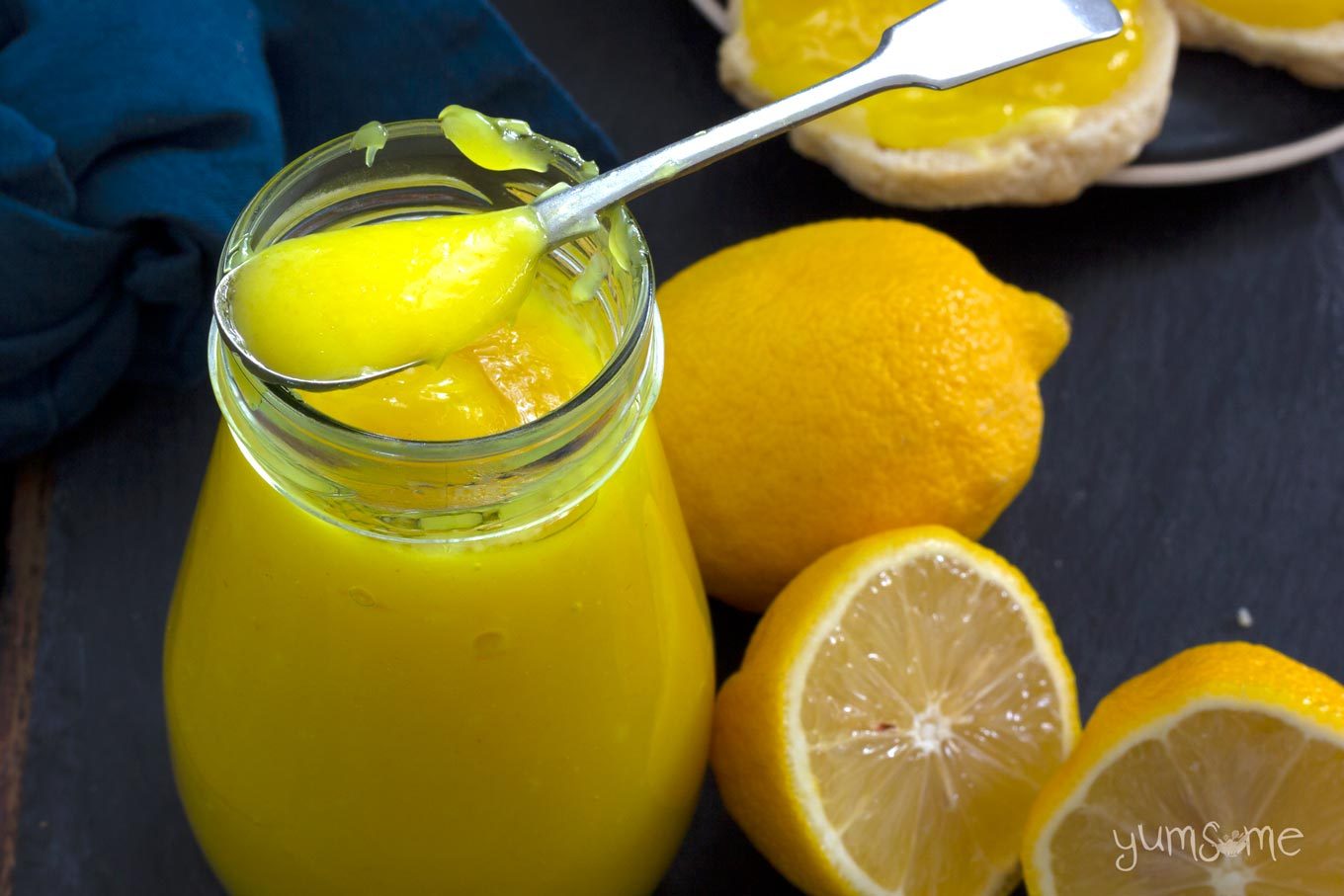
What is cornflour?
In other countries, cornflour is also known as corn starch.
I don't have cornflour, what else can I use?
Arrowroot works just as well as cornflour; however, I don't recommend tapioca flour (starch) because it's too gelatinous, and you'll end up with a nasty, gloopy mess.
Do I have to use vegan margarine?
I haven't tried it but I don't see why you couldn't use refined coconut oil. I'd be inclined to use three tablespoons instead of four, though.
Vegan margarine/spread tends to be around 70% fat, so if using coconut oil, which is 100% fat, you'll need to use less. 70% of 4 tablespoon = 2.8 tbsp.
Alternatively, if you don't mind having a vaguely coconutty lemon curd, you could try using creamed coconut, which is the same as coconut butter - the only difference being the price tag. Coconut cream is far cheaper than coconut butter!
Can I use bottled lemon juice instead of fresh?
Although fresh lemon juice will usually give the best flavour, if you need to use bottled, then by all means do but I recommend checking the label. Why? Because you'll often find additives such as lemon oil, flavouring, colouring, water, and sodium metabisulphite (sometimes labelled as sulphur dioxide) which is a preservative.
None of these things are bad, per se, but some people can have a sensitivity to sulphur dioxide. Also, you want as much lemon juice for your buck, as it were, so remember that the higher up on the food label, the greater the ingredient quantity. Rayner's PLj, for example, lists lemon juice at 90%, while in some other brands, it may be as low as 30%.
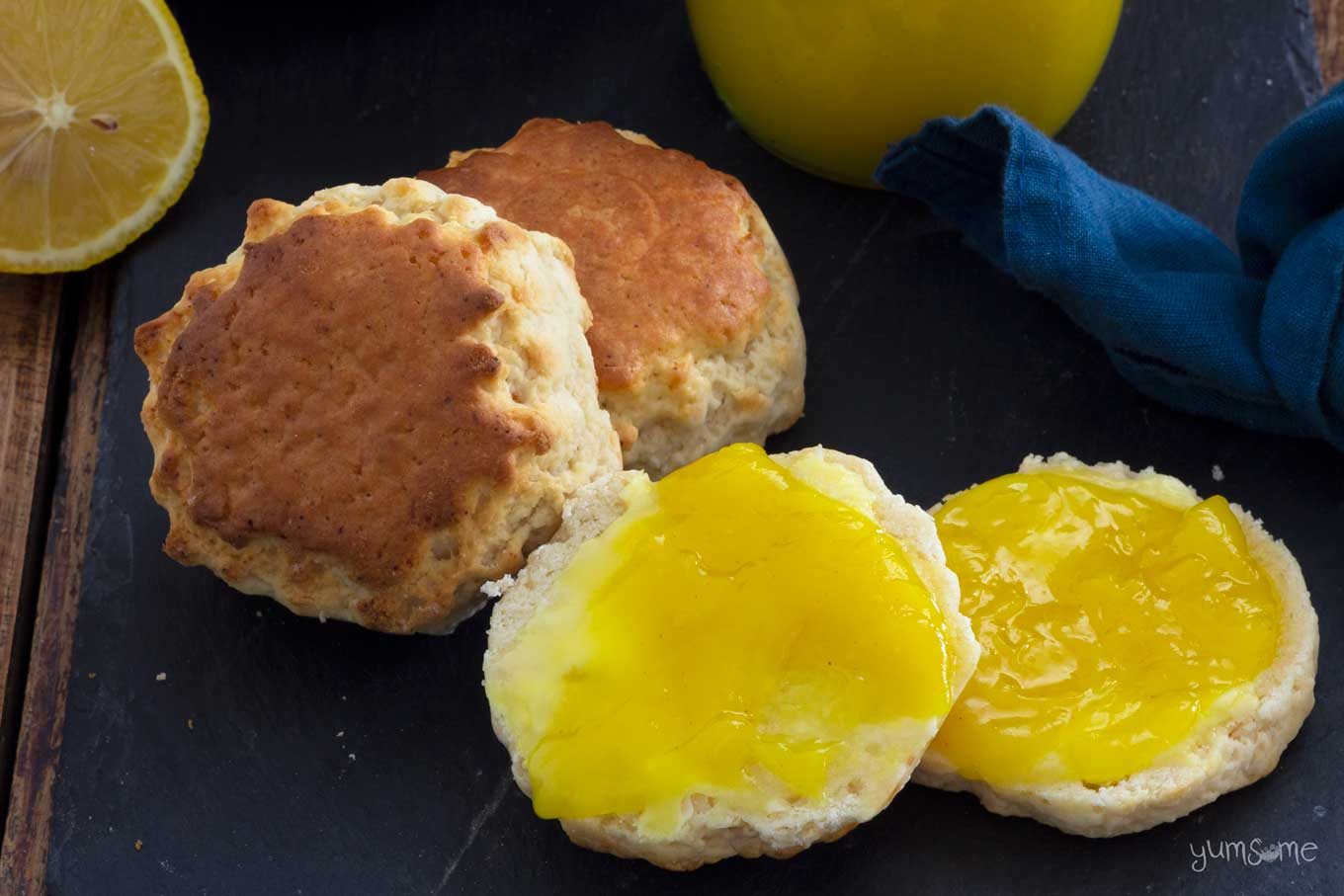
What does 'lemon juice from concentrate' mean?
Juices made from concentrates have undergone a process whereby all the water has been evaporated, leaving a powder, which is then reconstituted with water. Why is this done? Simply because it's more economical to transport powders than liquids, not just in terms of product longevity but because powder weighs far less than liquid. Plus, it is easier to pack. Juice from concentrate sometimes has vitamins, colour, and preservatives added to it.
Is juice from concentrate as good for you as fresh lemon juice?
To be honest, it can be. The nutritional quality of fresh juice begins to deteriorate as soon as the fruit is off the tree, and then more so once its extracted from the fruit. Freshly-squeezed orange juice, for example, really needs to be drunk within about 30 mins because after that, due to contact with oxygen, nutritional benefit rapidly decreases. Because of its added preservatives, juice from the supermarket will retain more of its nutrients longer than juice you've squeezed yourself.
That said, if you're cooking with juice - as for this vegan lemon curd recipe - it's all much of a muchness. The Vitamin C will be depleted anyway by the cooking (although not completely!), so it really comes down to taste, convenience, and personal preference. I use both because I don't always have fresh lemons to hand, and haven't always planned ahead. I do, however, always have bottled lemon juice in the cupboard!
Which are the best lemons for making this vegan lemon curd recipe?
Just use the bog-standard Lisbon variety. They have a good flavour, and yield a decent amount of juice. No need for more expensive ones, such as Meyer lemons.
I want to use fresh lemon juice but I don't have a citrus press or juicer, etc…
Guess what? Neither do I! Actually, that's not entirely true; I do have my gran's glass lemon squeezer but it's packed away in my storage unit 170 miles away!
To extract citrus juice without a fancy-schmancy gadget:
1. First roll the fruit back and forth a few times on your work surface, while pressing down gently.
2. Cut in half, widthways.
3. Take each half, and scrape it against the side of a glass.
This is the easiest and best way of making sure that all the juice is extracted from your fruits, and one I learned while living in India... home of super-inventive people!
Check out this video (not mine - I'm generally too embarrassed to ask permission to film street hawkers because it feels like an intrusion!):
What Can I use Vegan Lemon Curd For?
Lemon curd is a traditional British tea time treat, spread over scones or slices of bread - and very delicious it is too. My favourite is with scones - plain sweet ones, no sultanas or anything else added. I also love it on toast!
Vegan lemon curd is a perfect for a filling for pastries - such as lemon puffs - and tarts & flans (as we know!). For vegan lemon cheesecake too... proper cheesecake, that is! My gran used warmed lemon curd as a sauce for steamed sponge puddings. It was divine!
I also use lemon curd for making lemon meringue pie as it's always been my son's choice for his birthday instead of a cake. Thinking about it, lemon meringue pie is not a world away from those early lemon cheesecake recipes.
And speaking of cake, this vegan lemon curd also makes a great filling for cupcakes, especially with a swirl of vegan meringue on top. In addition, I make a lemon version of Victoria Sandwich, with lemon sponge instead of vanilla, and lemon curd in the centre, instead of jam. It's lovely. Of course!
In addition, you could have this vegan lemon curd with pancakes or crêpes, or even on ice cream and rice pudding!
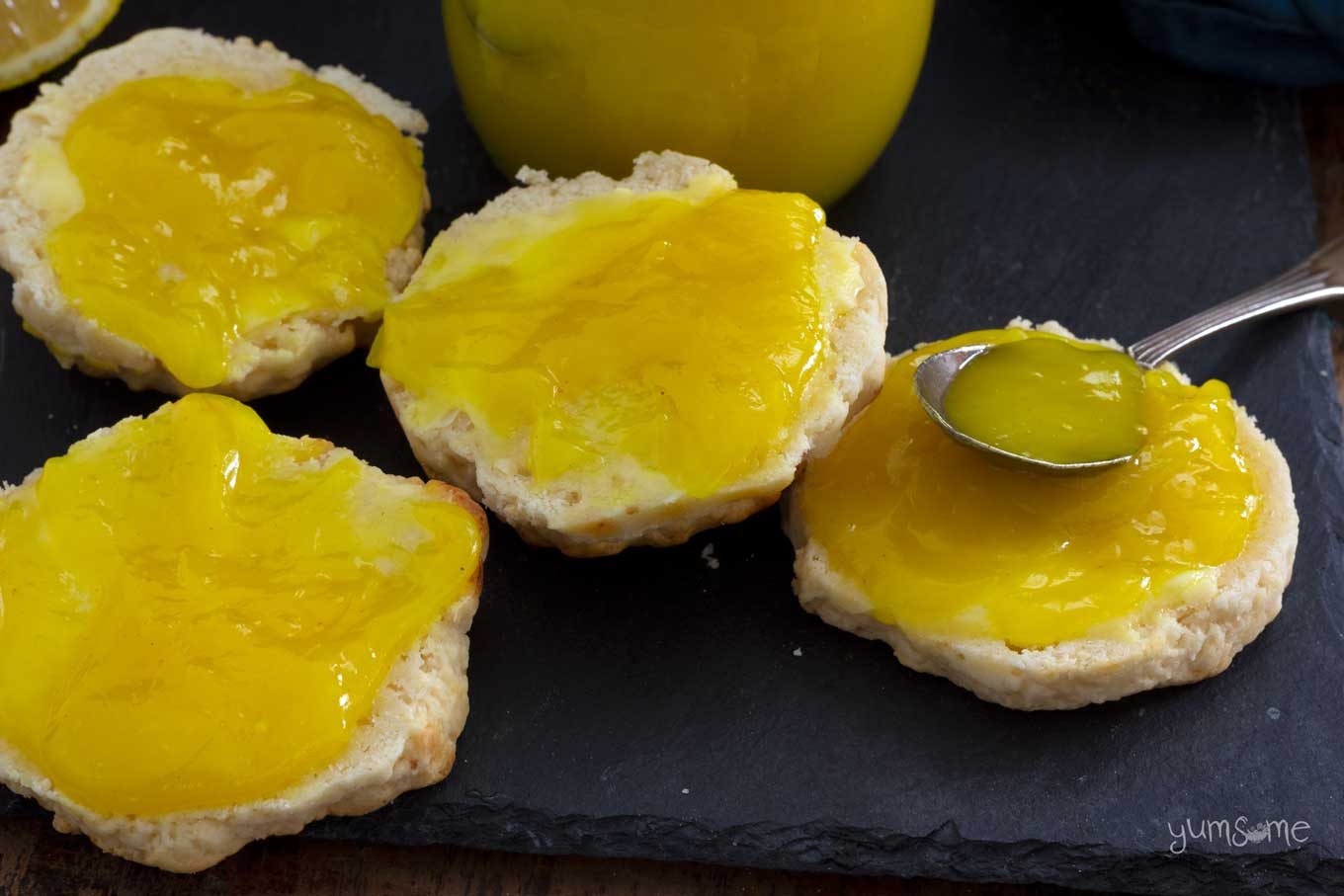
If you like this vegan lemon curd recipe, here are some more vegan yums for you!
You'll love this Easy Vegan Lemon Curd
Because it's…
- Sweetly tangy
- Intensely lemony
- Rich and velvety
- Made with just 4 readily-available ingredients
- Super-quick to make
- Free from gluten, soy, and nuts
- Eat-off-the-spoon delicious!
So, armed with all this knowledge, are you ready to press on and make your own lemon curd? I hope so!
Enjoy this easy vegan lemon curd recipe!
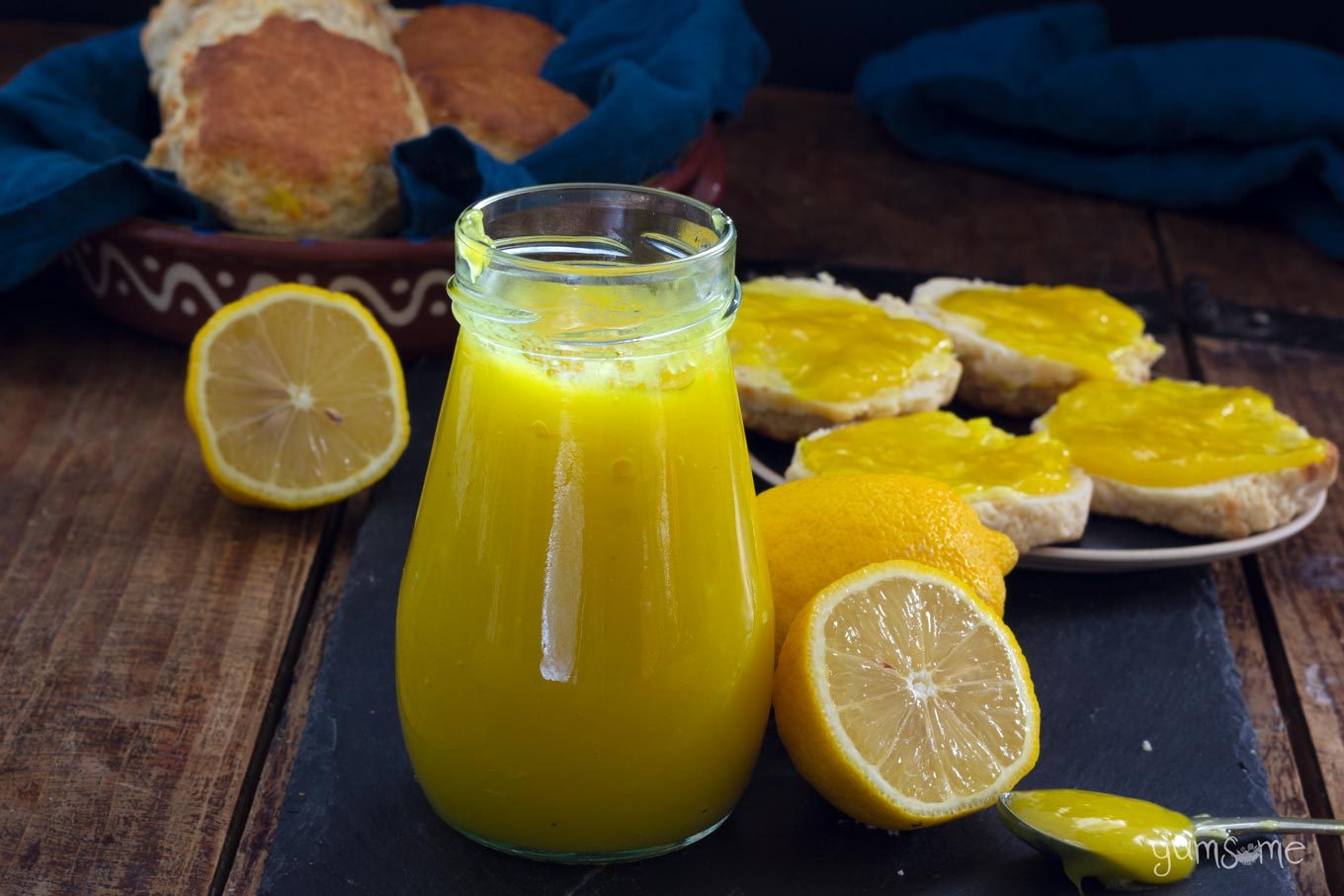
📖 Recipe

Easy Vegan Lemon Curd
Ingredients
- 165 ml lemon juice (approx. 4 large lemons)
- 3 tablespoon cornflour (a.k.a. cornstarch)
- 200 g granulated white sugar
- 4 tablespoon vegan margarine
Optional
- ¼ teaspoon ground turmeric
Instructions
- Bring the lemon juice - barring 1 tablespoon - to the boil in a medium saucepan.
- Place 1 tablespoon lemon juice, cornflour, sugar, and turmeric, if using, into a blender, and blend for 30 seconds or so, until smooth.
- Once the lemon juice is boiling, tip the contents of the blender into the pan, and whisk well.
- Bring back to the boil, whisking all the time, to ensure there are no lumps. Reduce the heat to medium, and continue to cook for around a minute, to dissolve the sugar.
- Reduce the heat to low, and simmer - stirring occasionally - for 3-5 mins, to make sure the cornflour is properly cooked in, and the lemon curd is smooth and silky.
- Remove from the heat, and beat in the margarine.
- Pour the lemon curd into a sterilised jar, and seal.
Notes
- 1 cup = US cup = 240 ml
- 1 tablespoon = US/UK = 15 ml
- 1 fl oz = US = 30 ml
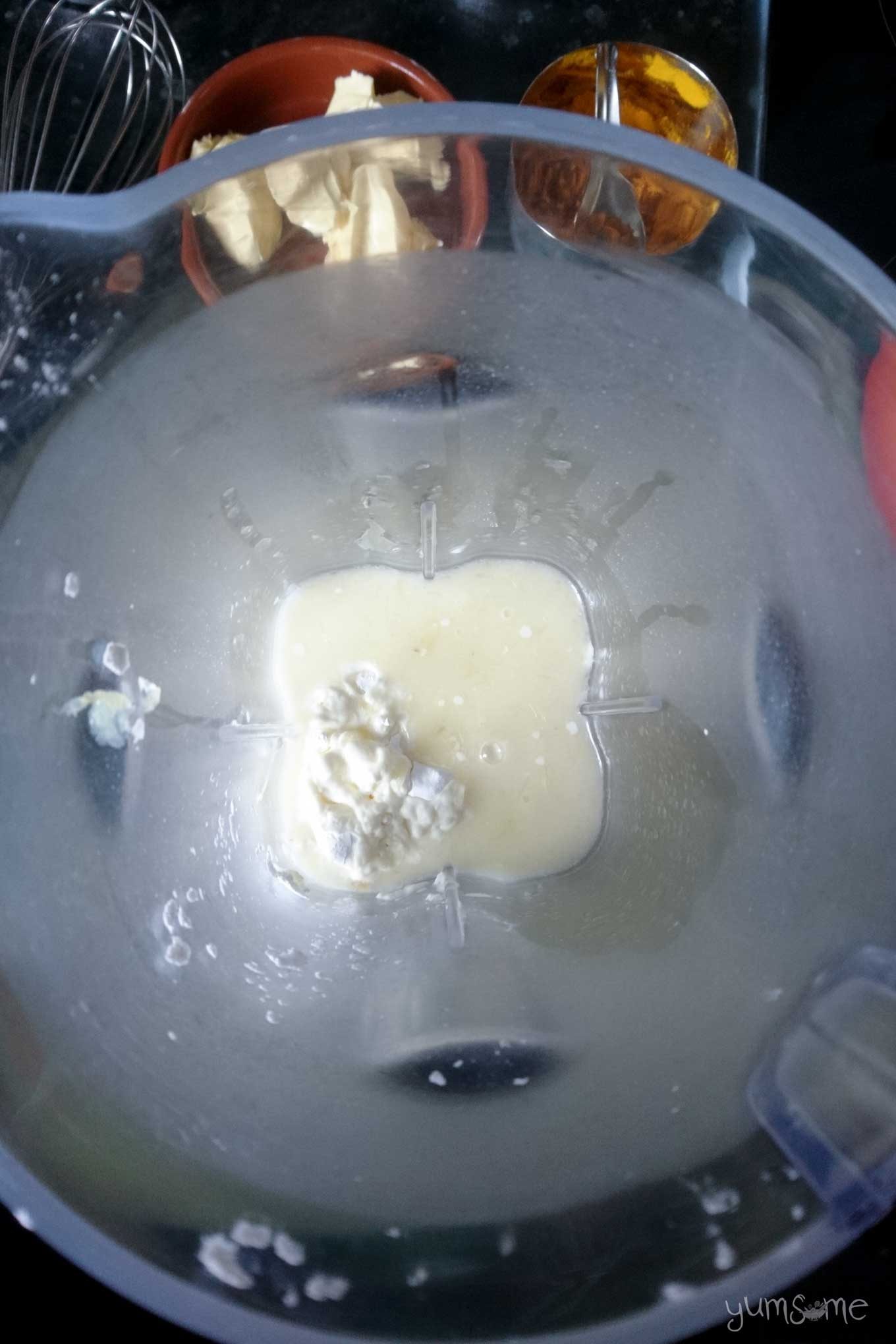
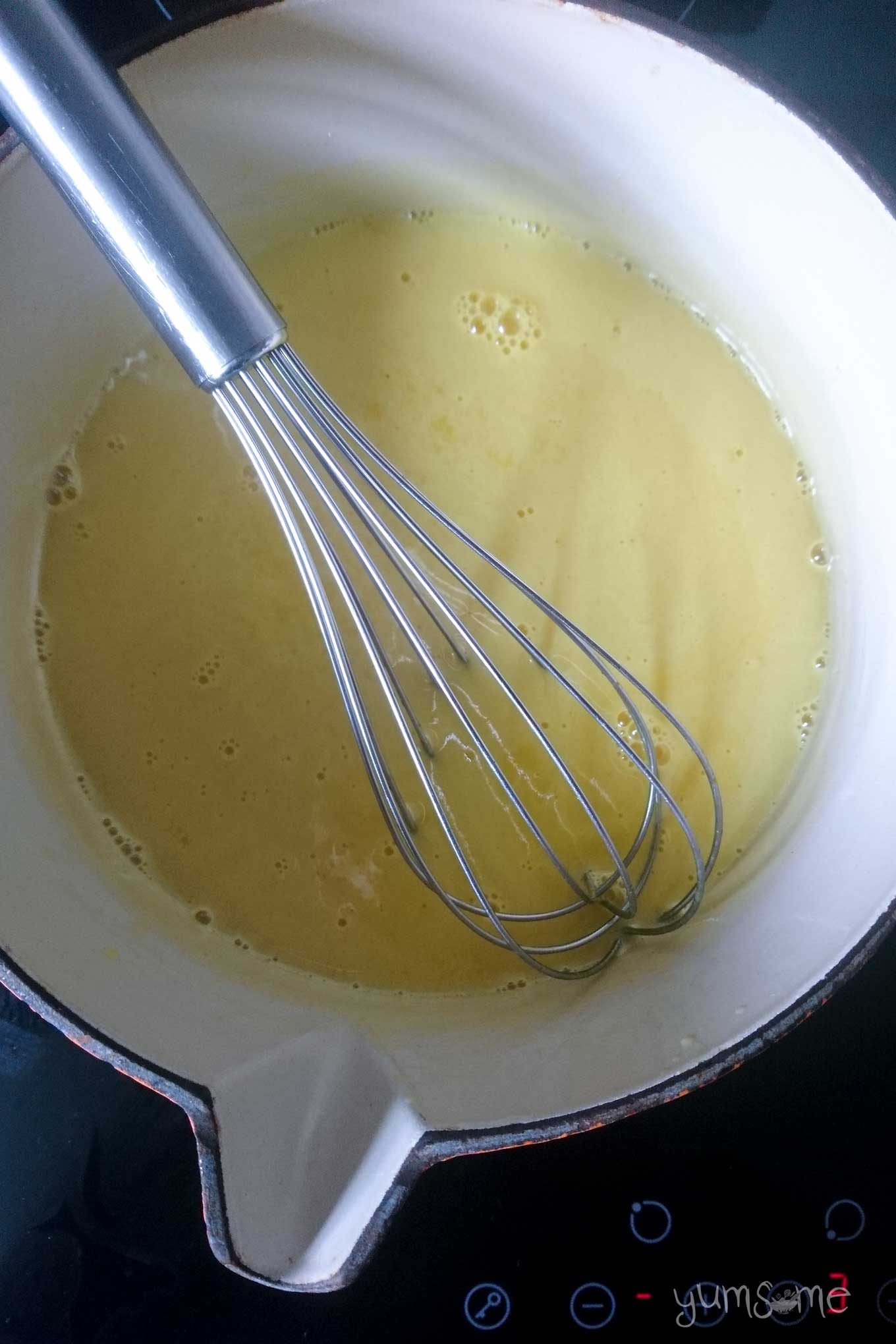
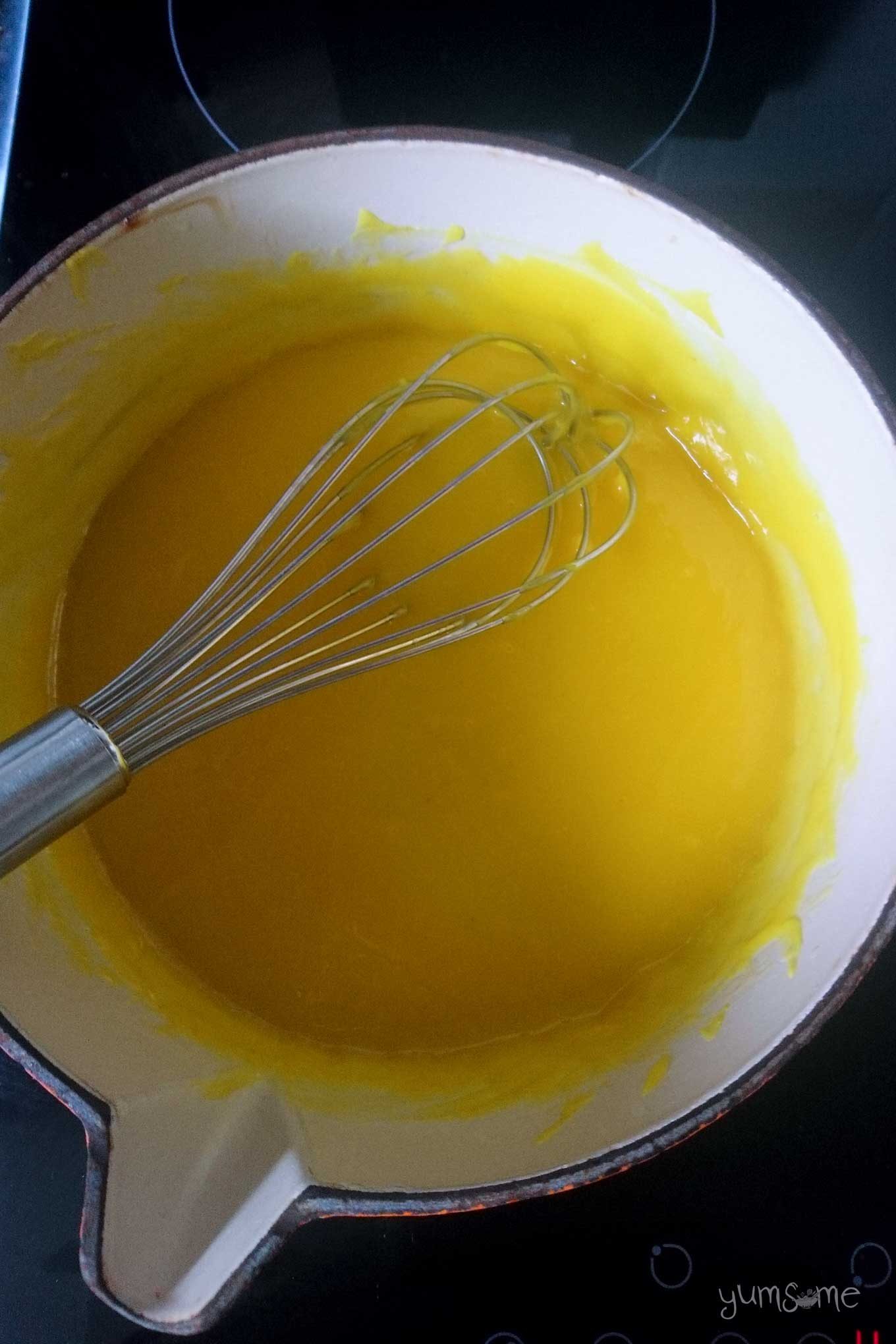
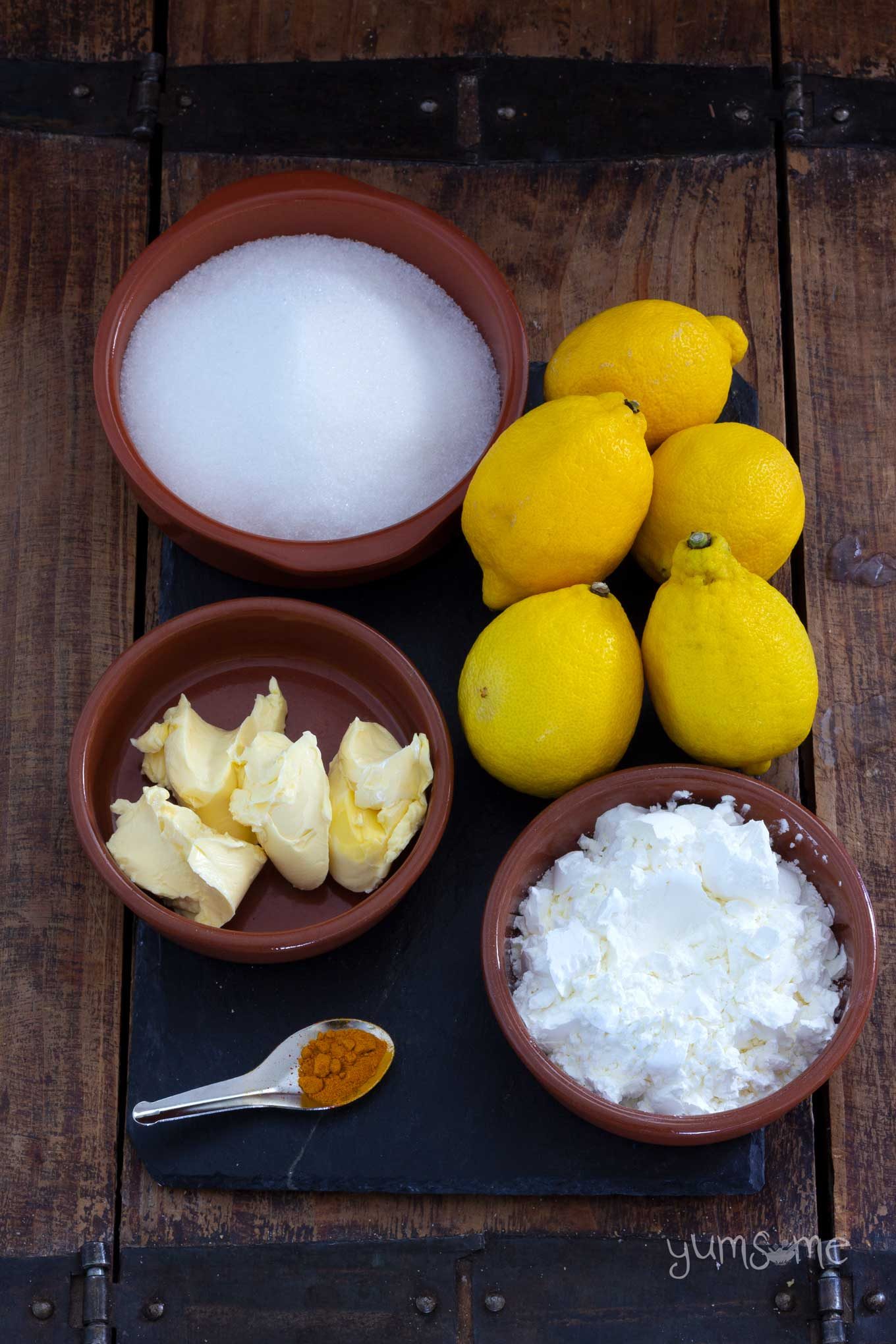
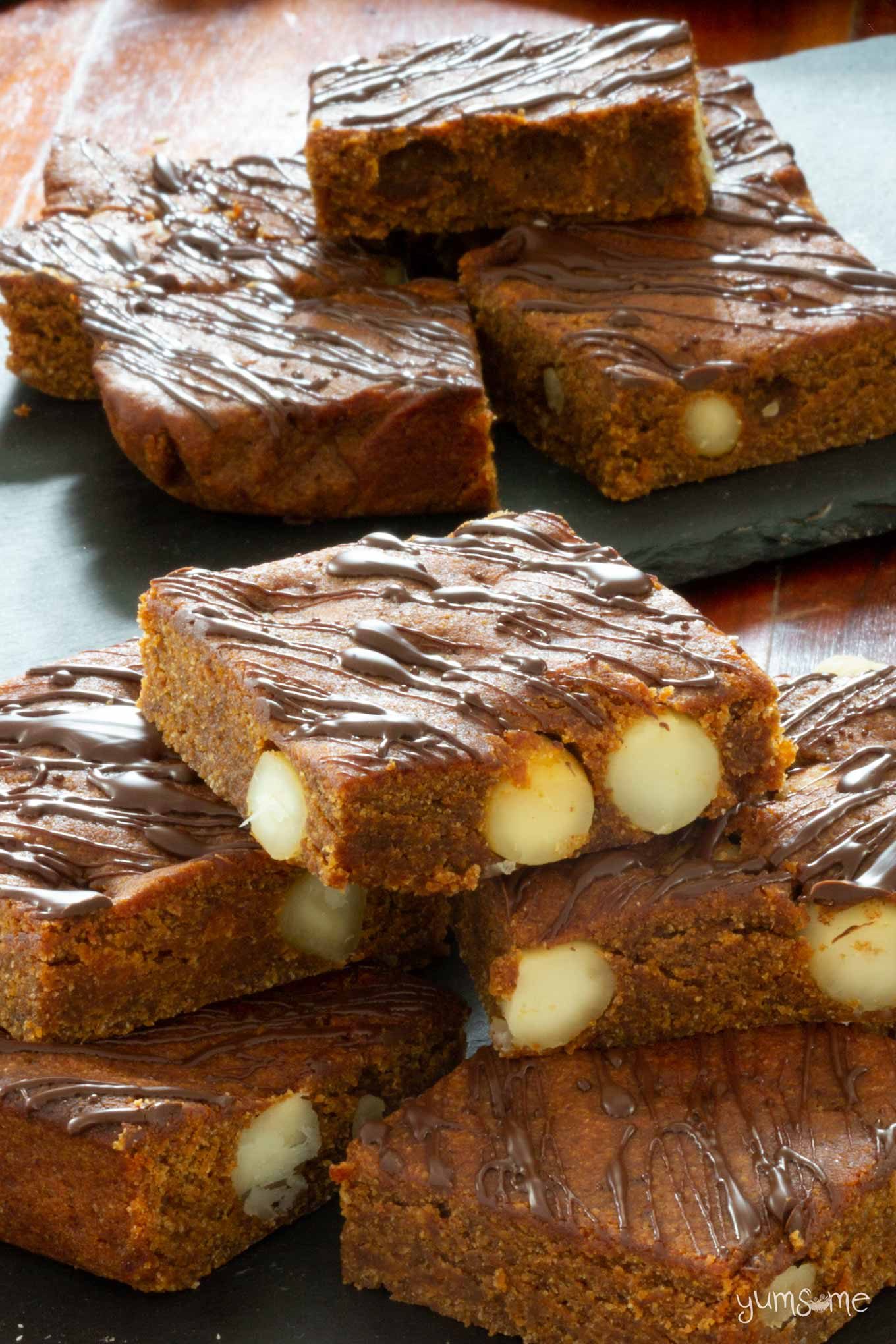
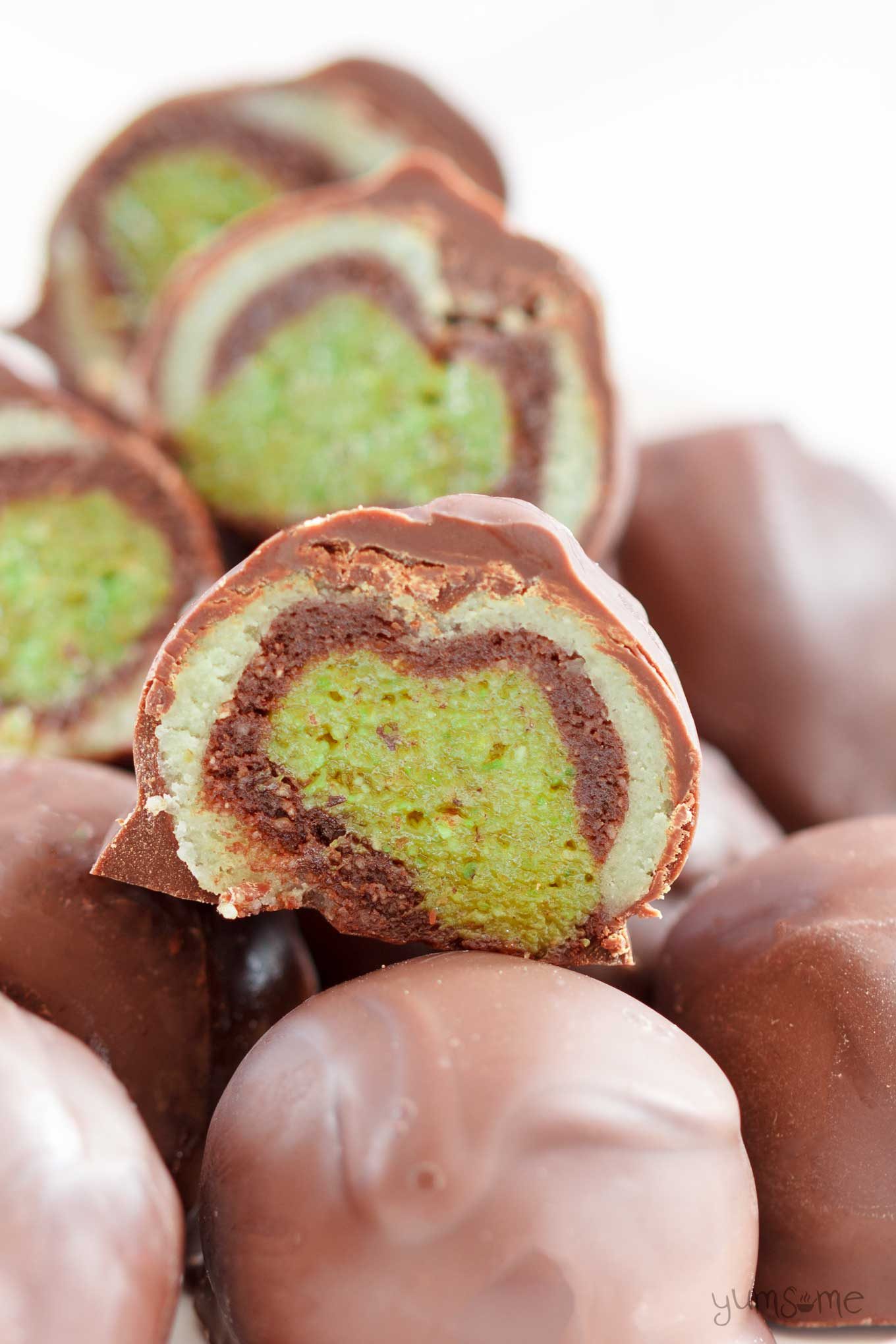
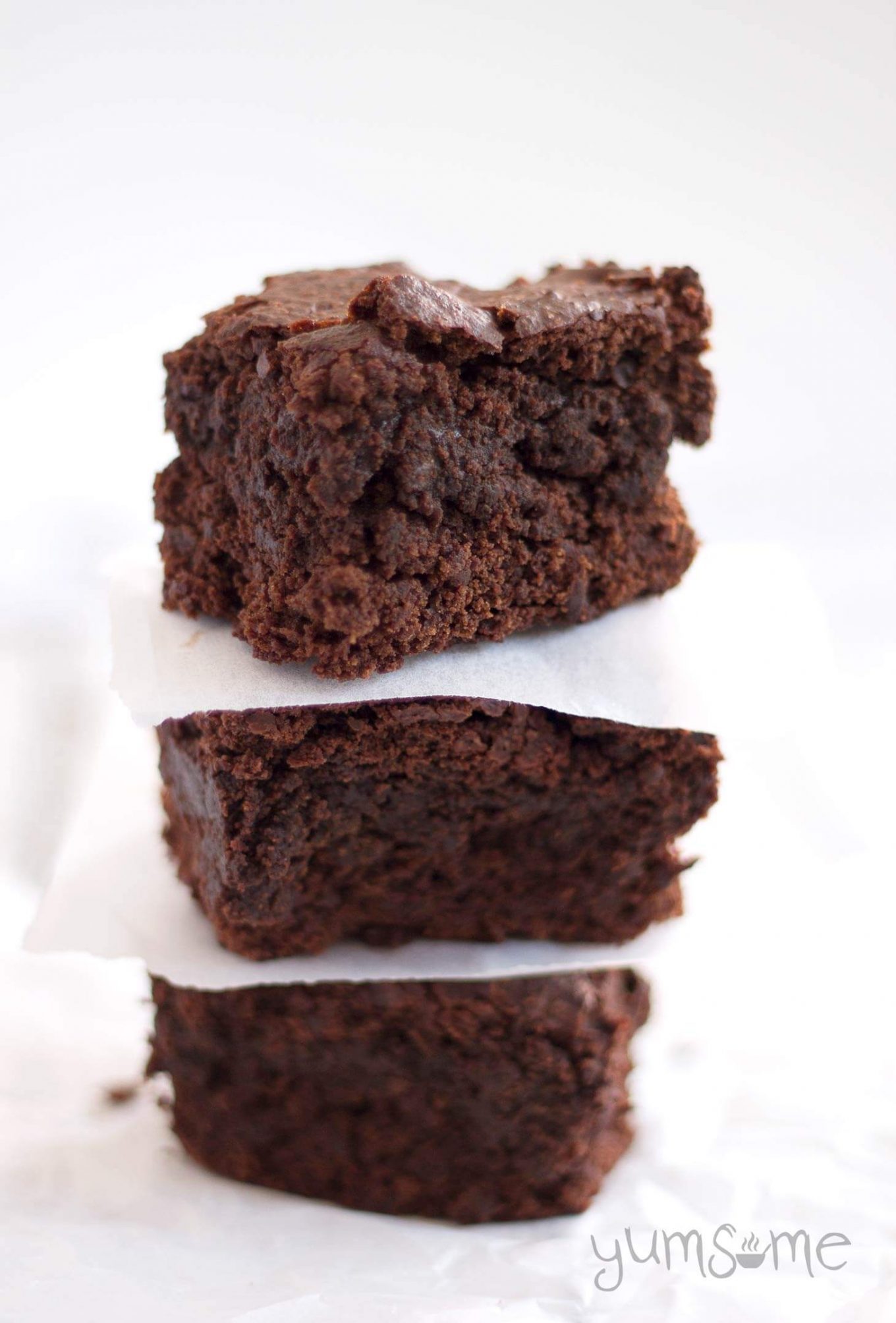
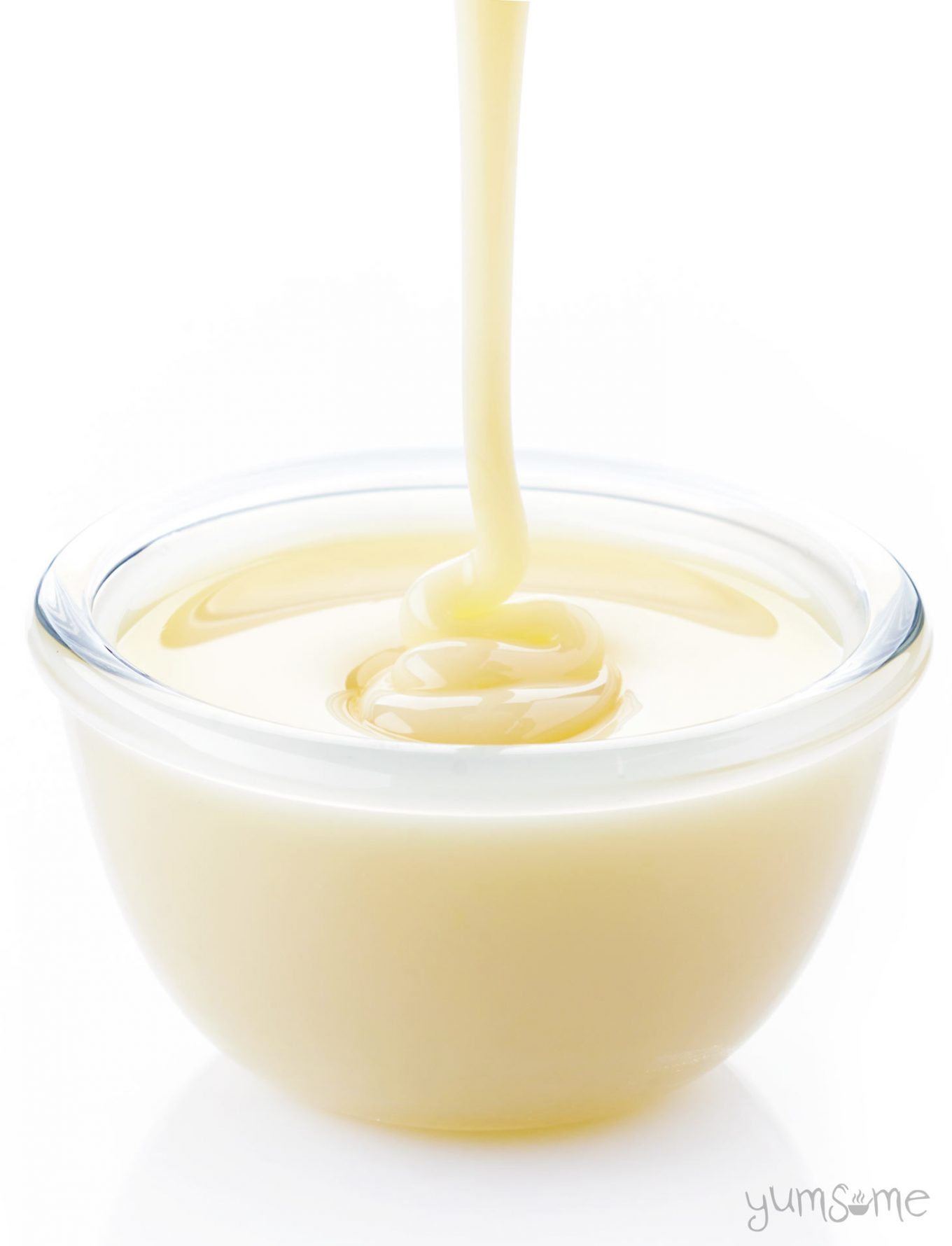
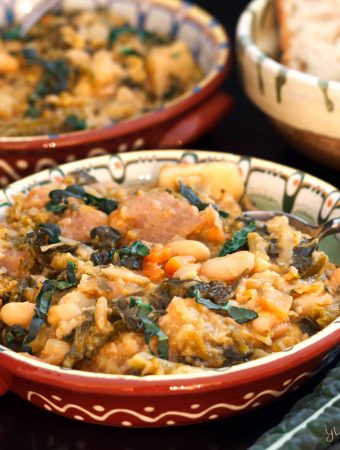
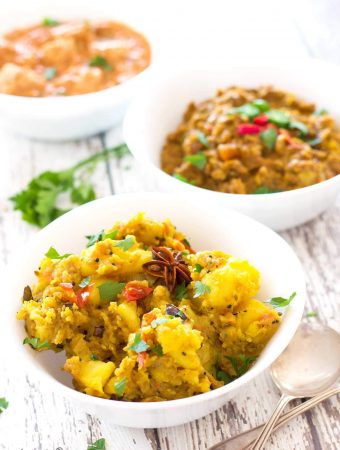
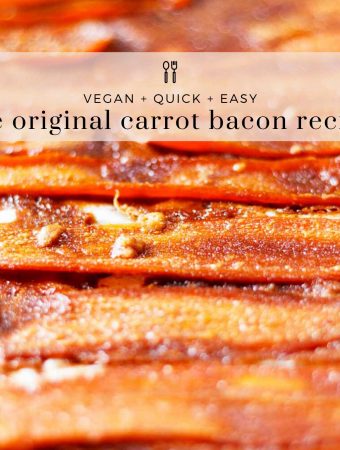


Janice
What a fascinating history of Lemon Curd and your vegan version looks delightful.
Nico
Thanks so much Janice, so glad you enjoyed reading it! xx
Jill @ MadAboutMacarons
Wow! What an incredibly informative post all on lemon curd. I love the historic research you've done on this and particularly fascinated (no guesses why) by the Paris Curd. The perfect go-to lemon curd post - and the vegan version looks lovely.
Nico
Thank you so much, Jill - I'm really pleased you enjoyed the post! xx
Choclette
You do come up with the most fabulous recipes AND photos. I want one of these pinned on my wall. Clever of you to use turmeric to get that deep yellow colour. Mine has always come from egg yolks.
AND I had no idea that loaf sugar was jaggery. I love jaggery, but don't manage to come across it very often.
Nico
Aww, Choclette, that is so lovely of you to say so. Thank you! xx
Cathy @ Planet Veggie
I never used to be much of a fan of lemony things but now I can't get enough and coincidentally, I'd been thinking about lemon curd recently and then I found your post, hooray!
Nico
Such synchronicity! I don't remember a time when I didn't love all things lemony... even lemon bonbons were (and still are) my favourite! I hope you love the lemon curd, Cathy! xx